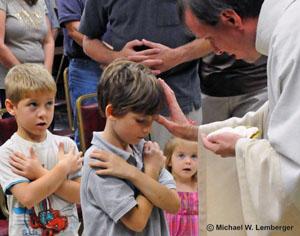
By Father Tony Herold
The initial meetings held throughout the Diocese of Davenport on parish planning surfaced several questions concerning the assignment of priests. As the chair of the Priests’ Personnel Board, I have been asked to respond to these questions.
The Priests’ Personnel Board was established to serve the diocese, its bishop, priests and people by making recommendations of priest personnel to the bishop for assignment for the good of the diocese. The board also assists in priest personnel development and pastoral planning. As such, the present diocesan planning process will have a great impact on the work of the Priests’ Personnel Board.
The board consists of representatives elected from the various groups of our priests based on years of ordination. Five groups constitute the priests in active ministry; a representative from the retired priests’ group also serves on this board.
The questions that surfaced in the planning meetings actually mirror some of the important issues the personnel board confronts on a yearly basis. Those questions include:
• Why aren’t the priests at St. Ambrose University in Davenport available or appointed to say Mass at churches needing help? Also, while it may be a short-term effort, why would we not consider re-assigning all priests from administrative and teaching positions and moving them to parishes and then filling their administration and teaching jobs with qualified lay people?
Actually, this process has been going on for some time now in our diocese. We no longer have any priests in full-time teaching positions in our secondary Catholic schools, and many priests who have positions on the diocesan staff and St. Ambrose University are available and providing ministry in parishes.
For example, Father Joe Wolf, the judicial vicar for the diocese, is also pastor of Our Lady of the River Parish in LeClaire. Father Ed Dunn, recently retired from St. Ambrose University, has been a pastor and now administrator of St. Mary Parish in Oxford and St. Peter Parish in Cosgrove for several years. Father Bud Grant is the sacramental minister to the parish of St. Andrew in Blue Grass and Father George McDaniel, the diocesan chancellor, is parochial vicar for Holy Family Parish in Davenport. Priests who are not involved in a regular ministry on the weekend — including many of our retired priests — are busy filling in for priests who are on vacation, retreat, or who are ill. Our retired priests are to be commended for their hard work in the diocese after they officially retire.
• Why are three Masses a weekend the limit when/if a parish has good staff/deacon support?
According to Church law (Canon 905), priests are allowed to celebrate Mass only once a day. However, the law states: “If there is a scarcity of priests, the local Ordinary (bishop) may for good reason allow priests to celebrate twice in one day or even, if pastoral need requires it, three times on Sundays or holy days of obligation.” Clearly the norm according to Church law is no more than two Masses on a Sunday. This norm has been acknowledged in the Living the Faith document that was the result of diocesan planning five years ago and is part of the wellness policy promulgated several years ago for the priests of our diocese.
• Are Iowa City/Davenport parishes being looked at for sharing clergy? Sharing with a several-block-distance parish certainly is easier than parishes over 30 miles apart.
The planning process that we are engaged in at this time requires all of our parishes, urban and rural, to look at the best way to share clergy. Davenport and Iowa City are no exception. The Living the Faith document and previous planning had a great impact on priests ministering in urban areas such as Keokuk, Burlington, Muscatine, Clinton and Ottumwa. Often we think the rural areas have been hit the hardest, but every community has been affected by parish planning.
• Why are the priests assigned with no choice where they go? Then many are moved?
Every priest in the diocese has input on his assignment and agrees to go where he is most needed. Each year a priest is mailed a form to fill out that is to be returned to his representative. This form indicates his preferences for assignment in the diocese, his desired time for a new assignment, when he might retire and so on.
The personnel board begins its meetings in November each year and looks at those surveys. They take into consideration the priests who are requesting retirement and those who indicate a desire for an assignment change. Since the board works with sensitive information about the priest, his assignment and the people he serves, all board members must maintain confidentiality and promise not to discuss sensitive information from our meetings.
• We have many good deacons in our diocese. Shouldn’t they be used more effectively?
The Priests’ Personnel Board does not assign deacons. Most deacons who are not retired are employed in various occupations and are assigned to communities where they have obligations to their family and their work. The bishop ultimately assigns deacons and takes into consideration their unique circumstances. I believe the deacons in our diocese are used quite effectively.
I hope this article sheds some light on the workings of the Priests’ Personnel Board. The board works in concert with the priests of the diocese and the needs of the people. The planning process that we are now undertaking is vital to the future of our parishes and the good of our diocese. Not all of us priests have equal talent or abilities, but together we can move into the future with hope as we continue to pray that the Lord will raise up men to follow in the footsteps of Christ as priests. We also pray that many dedicated laity working as parish life administrators and pastoral ministers will continue to serve in our parishes. Together we form communities of faith and vibrant centers that glorify God.








